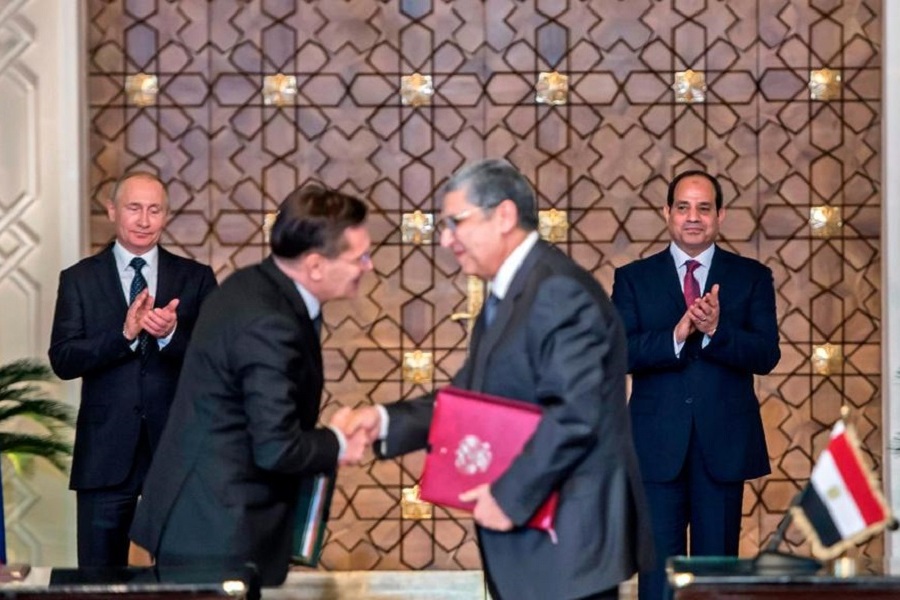Sisi and Putin strengthen bonds with nuclear plant deal
By Aliheydar_Rzayev Wednesday, 13 December 2017 4:56 AM

The National -- Russian president Vladimir Putin arrived in Cairo Monday with expectations that flights from Moscow carrying tourists would soon to follow his summit with president Abdel Fattah El Sisi – which together with deals for a nuclear power plant and expanded defence cooperation, bring Russo-Egyptian ties to their warmest level since the early 1970s.
As crucial as Russian support is for Mr El Sisi’s economic and security agenda, officials here are most cheered by the increasing alignment with Moscow on core Middle East issues at a moment of consternation and confusion in Egypt’s relations with Washington and US president Donald Trump.
“The co-operation is not only about weapons, it’s also about what's going on in the region,” said Egyptian air force commander Hisham El Halaby. “We’ve cooperated on Syria and now the Jerusalem embassy announcement by the US is a golden opportunity for Russia to have a more effective role in Middle East peace efforts.”
While Russia recognised West Jerusalem as Israel’s capital in April, Moscow has insisted that its embassy could not move there until successful two-state talks resulted in a Palestinian capital for an Arab state in the eastern part of the city.
“The United States is unfair, dishonest, and obviously siding with Israel,” said Mr El Halaby, reflecting the continuing anger over President Trump’s recognition of Jerusalem as Israel's capital.
The continuing diplomatic fallout over the decision announced on Wednesday includes the revocation of invitations extended to US vice president Mike Pence by Egypt’s top Muslim and Christian clerics and emergency meetings and phone calls between Mr El Sisi, Jordan’s King Abdullah and Palestinian president Mahmoud Abbas.
Mr Abbas, who has longstanding ties with the Russian leadership, met Mr El Sisi on Monday as regional efforts intensified against the US move and with the public in Cairo supporting both a new emphasis on the Palestinian cause and reinvigorated ties with Russia.
“This helps Egypt to gain its position back as heart and defender of the Middle East,” said Kamal Soliman, a 28-year-old general practitioner. “Countries in the region have lost faith in the USA and Putin is now stepping in with a nuclear reactor and arms deals. Russia’s influence is growing.”
Dr Soliman’s view is reflected in statements issued by Mr El Sisi’s aides.
“There is now a convergence of views between Russia and Egypt on several regional issues, especially the situation in Syria and Libya,” said spokesman Bassam Rady. "Egypt and Russia are in agreement on the rejection of US president Donald Trump's decision to move the US embassy to Jerusalem.”
The US and European and Asian countries all bid to build the nuclear facility and winning the deal is a commercial coup for government-owned Rosatom as well as a political triumph for Mr Putin.
The Dabaa nuclear power plant, to be built on the Mediterranean coast, about 130km north-west of Cairo, will have four reactors producing 1,200 megawatts each to feed Egypt’s energy-starved industrial and commercial consumers. The deal follows an announcement in October that Russian state petroleum firm Rosneft would acquire a 30 per cent stake in the development of Egypt’s Zohr field, the largest gas field in the Mediterranean Sea, from the Italian company Eni.
But a resumption of Russian tourist flights is what would really boost the Egyptian economy.
Before the 2011 Arab Spring, tourism made up 13 per cent of Egypt’s gross national product, bringing in nearly US$20 billion (Dh72bn) a year, according to government figures.
Moscow halted civilian air traffic to Egypt in 2015 after ISIL claimed the 2015 bombing of a Russian Metrojet flight flying out from the Red Sea resort Sharm El Sheikh, killing all 224 people on board. Russians were the largest group of foreign tourists, with Red Sea destinations receiving up to 3 million per year.
Egypt has been tightening security at its airports to meet Russian demands. Mr Putin praised the efforts but stopped short of giving the all-clear, according to an Egyptian presidency statement. Ironically, the enhanced measures at Cairo airport won approval recently from the American Transport Security Administration.
The statement said the two countries would also explore setting up a Russian industrial zone in the Suez Canal Economic Zone, as well as logistics area for Egyptian exports to Russia. However, bilateral trade is relatively low compared to the EU, US and China, the "really significant players in the region", said Mona Khalil, executive director of the Russian-Egyptian Business Council.
“Russian business in general is still passive to cross local borders and is hesitant to work abroad due to historical reasons of course — private sector in that country is only 25 years old,” she said.




























Add new comment